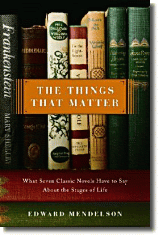
Friend of the Blog Cary Federman pointed me to
Adam Begley's interesting review of
Edward Mendelson's
The Things That Matter: What Seven Classic Novels Have to Say About the Stages of Life. The book is a study of seven novels—Frankenstein, Wuthering Heights, Jane Eyre, Middlemarch, Mrs. Dalloway, To the Lighthouse and Between the Acts—which, his subtitle promises, have something to say about “the stages of life”: birth, childhood, growth, marriage, love, parenthood and (a touch of euphemism here) “The Future.” The Things That Matter makes very few startling claims (provocation isn’t friendly), but taken as a whole, it is startling—especially in the way it relates novels to the “inner life” of the reader.
In the old days, lit crit would teach us how a novel works (or fails to work, due to the tragic disconnect between signifier and signified), or how the world works (or fails to work, due to the perfidy of capitalism). Mr. Mendelson is more like a highly literate self-help guru: He wants to teach us about ourselves as “autonomous persons”; he wants to reach “readers … who are still deciding how to live their lives.”
There's more of interest in the review: click
here to check it out.
--Marshal Zeringue
 Friend of the Blog Cary Federman pointed me to Adam Begley's interesting review of Edward Mendelson's The Things That Matter: What Seven Classic Novels Have to Say About the Stages of Life.
Friend of the Blog Cary Federman pointed me to Adam Begley's interesting review of Edward Mendelson's The Things That Matter: What Seven Classic Novels Have to Say About the Stages of Life. 




